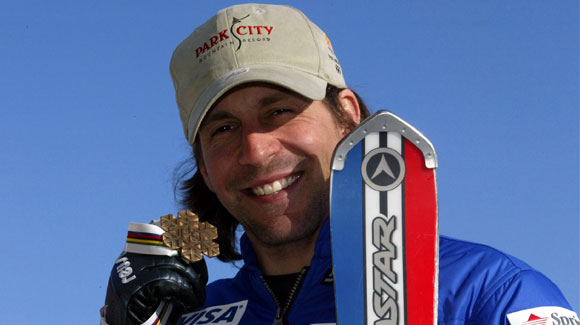Schlopy Joins Legends in Hall of Fame

STEAMBOAT SPRINGS, CO (April 10, 2015) – Throughout his 18-year career, Erik Schlopy often traveled down the unbeaten path. Schlopy was a three-time Olympian and seven time national champion who had one of the longest and most successful careers in U.S. ski racing history. He was a World Pro super G champion and a bronze medal winner in the giant slalom at the World Championships in 2003. Schlopy’s story is much, much bigger than a tale of his skiing success, though. Throughout his career, Schlopy persevered through multiple injuries and challenges, including a broken back (1993), four knee surgeries and multiple other injuries. Despite these challenges, he managed to fight through and find success.
His dynamic career tells tales of perseverance and tenacity—two traits that he believes transcend the world of sport and have heavy application in the business world.
“I’m still learning the power of sport and how to apply it post-career,” said Schlopy. “The further I get away from it the more I realize how much it will help me in the long run. The tenacity it takes to be an Olympic skier or an Olympic athlete—you can apply that to anything and you’re going to make it far based on the fact that you’re going to outlast other people because you have the determination.”
Aside from determination and hard work, Schlopy stresses the importance of mental fortitude and its application to life after ski racing.
“The mental fortitude that comes with having to be tough every day…and also blocking out your competition; not caring what other people think. That’s one of the biggest lessons I see with my kids…they get wrapped up in what people think of them. And when I think back, I realize that most of my competitors and my teammates didn’t care what other people thought—they just did what they did and then just kept on going on. They never looked around…they just looked ahead.”
The passion emanating from Schlopy’s voice as he relayed this message was palpable, and it is indeed an important lesson for young people to adopt.
Beyond the perseverance and tenacity, Schlopy was incredibly professional both on and off the snow. When Schlopy joined the U.S. Ski Team coaching staff in 2013, Head Men’s Coach Sasha Rearick noted, “There isn't a guy that was more professional, more dedicated and more influential to the other guys on this team than Erik was when he was an athlete. He was a leader who would tell me if something wasn't working, but would also be the first guy to say you did a good job. He led by example.”
That same professionalism has carried through to life after the U.S. Ski Team for Schlopy. In his real estate career—a role he notes feels like his first real career since he retired, though he has dabbled in numerous projects like World Cup Dreams Foundation and Co-Founding Soul Poles—he has carried a very similar mindset to his ski racing days. He draws similarities between sport and business.
“In skiing you have teammates, but you compete as an individual,” he said. “That’s very similar to real estate, where I’ve got teammates but we’re all individuals…it’s not like some other guy makes a sale and I benefit, but at the same time we support and help each other.”
The message he wants to make clear: sport really does transcend everything.
“I think life would be so wonderful, and it shows that sport really transcends everything, because I don’t think that perfect world exists outside of sport where my teammates were my biggest competitors – I mean, Bode and Daron and all of those guys. On race day, we all wanted to win, but when we trained and raced we brought each other up because we knew that if we helped each other, we would become better ourselves. If I could pass that message along to the business world—or the world in general—I think the world would be a better place.”
Schlopy’s standout memories include his St. Moritz World Championships podium, which he shared with teammate Bode Miller. However, from a race perspective, it was in November of 2000 when the World Cup used to be in Park City.
“Americans hadn’t had an American skier in the top 10 in almost 25 years and I started 31st and was 10th or 11th after the first run, and then came down and was winning and ended up in 4th, just a couple hundredths off the podium, but being in the top 5 broke the seal after 20+ years of no Americans in the top 20 in GS, or had even cracked the top 10. So that was a huge moment for me. It was home, friends and family were there, and I got to share it with everyone.”
Schlopy was also known for innovation in and around the sport. Schlopy is credited with initiating the idea of establishing a European home base when he and Bode decided to rent an apartment in Innsbruck and pushed to do it when no one wanted them to do it. They tried it and it worked, the results followed, and now the U.S. Ski Team has a home base in Austria. Additionally, many credit him for being the first racer to “double stack” lifters under the bindings in 1992, which increases leverage and therefore edge angle resulting in more speed.
On Saturday, Schlopy will join nine others as she is inducted into the U.S. Ski and Snowboard Hall of Fame at a ceremony in Steamboat Springs.
It’s hard to narrow down his mentors throughout Schlopy’s lengthy career, but perhaps the most influential in his career include Warren Wilkinson in Buffalo, Mark “Hutch” Hutchinson in Stowe, Vermont, who taught him the importance of having fun in sport and relaxing. Additionally, at Burke Mountain Academy, Crawford Pierce was hugely influential, as he stayed with Schlopy until he was 21 and definitely Schlopy’s number 1 influence in his career, “he was more of a zen approach and he was more about making sure the athlete was in touch with themselves and understood their mental game, and more of an athlete-first guy.” When he came back from the pro tour, Jesse Hunt and he meshed very well and Schlopy had his most successful seasons with Jesse. Phil McNichol was there for eight years while Schlopy was on the team, and Schlopy notes McNichol played a vital role as he hired all of the coaches that worked so well together and made it fun, and that’s what kept Schlopy around.
Though Schlopy had quite the career, he still doesn’t feel like the Hall of Fame honor has quite sunk in. He wishes all of his friends and family could join him this weekend, because—as he says—“there’s a certain finality to it.” In a way, he feels like this is the height and nothing else can top this honor. An honor Schlopy didn’t expect.
“I didn’t feel like I’d be inducted. I was surprised that the first time I was on the ballet I was inducted; I thought that was really cool,” he said, “I think there’s a lot more to my career than my results, and I think that’s being recognized and I’m really proud of that.”
With gratitude comes a certain amount of sadness and a little bit of a heavy heart for Schlopy, though. He says of his feelings about the induction he thought to himself, ‘Wow this is it, this is the height of it – all of my achievements will be celebrated—but I have 50 years to live, and I don’t think there’s going to be anything else after this,’” he laughs. We are confident there’s much more to come, Erik.
Saturday, Schlopy will take the stage in Steamboat joining nearly 400 other Honored Members of the U.S. Ski and Snowboard Hall of Fame. He will be formally enshrined in this September in a special ceremony at the actual Hall of Fame in Ishpeming, MI, the birthplace of organized skiing in America.
